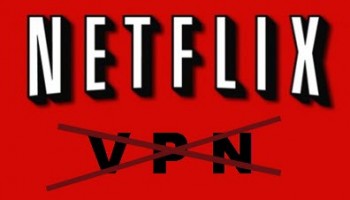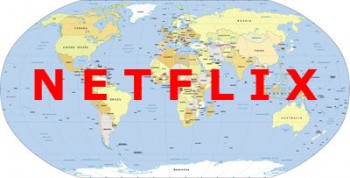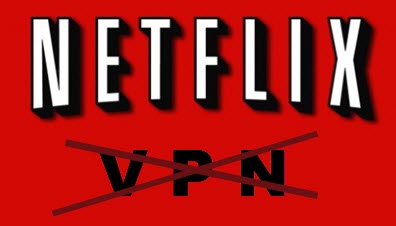Netflix recently announced it will be beefing up its campaign to prevent customers using VPNs and DNS proxy servers to view content outside of their specific region:
…in coming weeks, those using proxies and unblockers will only be able to access the service in the country where they currently are ~ David Fullagar, Vice President of Content Delivery Architecture at Netflix.
 Mr. Fullagar asserted that “if all our [Netlix’s] content were globally available, there wouldn’t be a reason for members to use proxies or unblockers“, further adding “we are making progress in licensing content across the world“.
Mr. Fullagar asserted that “if all our [Netlix’s] content were globally available, there wouldn’t be a reason for members to use proxies or unblockers“, further adding “we are making progress in licensing content across the world“.
He did not, however, provide specifics about the technology that would be used to stop the use of VPNs and proxy servers, saying only that Netflix employs “the same or similar measures other firms do”. Which has led to a number of tech writers and analysts casting doubt over just how effectively Netflix will be able to target VPNs and the like.
Writing for The Conversation, David Glance of the University of Western Australia said it was “very unlikely” that Netflix would be able to block all known VPN providers.
The truth of the matter is that Netflix will indeed find it difficult to shut down VPN access to another country’s content. TorGuard and other VPN providers will be able to keep switching Internet addresses of their VPNs faster than Netflix will want to block them. Other services like Hulu for example have tried to block VPNs far more aggressively than Netflix in the past and have had limited success.
And VPN provider TorGuard told it’s customers “not to worry“:
For those of you who rely on TorGuard VPN service to unblock Netflix content unrestricted, you don’t have to worry. Netflix will be pushing this plan forward soon, and when that happens, TorGuard will immediately deploy new server IP addresses so users can still bypass blocks. <source>
Regardless of how difficult the blocking might or might not be, it’s highly likely that Netflix is merely responding to pressure from content holders and just how much effort the company will put into actually enforcing its blocking policy is open to question. Considering that if Netflix is successful in blocking access to content it could potentially start losing subscribers in large numbers… my guess would be, not too much.
Full Global Availability – A Pipe Dream?
 It would certainly be nice if everyone across the world were able to access Netflix’s full library of content, regardless of county of residence. Here in Australia, for example, we have a little over 2000 TV shows and movies to choose from compared to almost 6000 in the US. However, with so many providers vying for the rights and regional licensing varying from country to country, I seriously doubt Netflix will ever see its goal of full global availability come to fruition.
It would certainly be nice if everyone across the world were able to access Netflix’s full library of content, regardless of county of residence. Here in Australia, for example, we have a little over 2000 TV shows and movies to choose from compared to almost 6000 in the US. However, with so many providers vying for the rights and regional licensing varying from country to country, I seriously doubt Netflix will ever see its goal of full global availability come to fruition.
Personally, I see this as just another push from content holders to restrict people’s viewing options so they can maximize the amount of money they make. The ironic aspect is that, according to consumer advocacy group Choice, the number of people regularly pirating in Australia has dropped by a quarter since the launch of Netflix in that country.
What do you think? Will Netflix be successful in blocking all VPNs and proxys? How hard will Netflix even try? Is full global availability a mere pipe dream or will it become a reality?

Netflix should be flattered that they are reaching so many customers. Their rates are good, but the restrictions they impose on a region by region basics is a problem they need to resolve, and not attack their members.
On a similar note, satellite users in Canada beat the system by purchasing the product from USA, so it had the ability to get US content. No sure what happened at the border, Mindblower!
Hey MB – I don’t see this as Netflix attacking its members. I firmly believe that it is merely posturing to appease content rights holders. Of course, I could be wrong. 🙂
And it’s not actually Netflix which imposes the restrictions, these limitations are due to regional licensing. For example; if Foxtel (our local PayTV provider) owns the regional rights to The Walking Dead, Netflix cannot legally air that program in Australia. There are lots of players bidding for these rights, which usually include exclusivity.
That’s why I believe the notion of full global availability is not possible, competition will see to that.
Yes indeed it is the license holders who continue to apply these long outdated restrictive practices to squeeze every las drop of profit from their films. The main winners in this will be the commercial VPNs who, as pointed out can change their proxies to often to give netflix the chance to block them all. This will hit users as it means that the free proxy services will be dissproportionately affected.
The irony is that, when producers are justifiably trying to eliminate piracy, many users will give up trying to be legal and use their proxy service to access pirated content. Netflix could have argued for many years that it is the consumers and not them who broke the conditions – ie turned a blind eye to the small minority of people that viewed in this way. I suspect 80% of their viewers use TV apps and the like where proxies are almost impossible to use.
My last though is to wonder if the announced price increase for netflix is not connected in some way to the extra work they now have to do!
No, I believe you are correct in your thinking Jim. Content holders are becoming downright Hitler in their attempts to hold on to everything they believe is theirs. So be it. we can vote with our wallets.
Also, I didn’t mention it before on the other article about Netflix, but they told me that Windows 7 is dead as is IE11 when I called them up about some funny things I have been seeing in IE11. Basically I was told that they re-did their website and don’t support IE11 on Windows 7 and to use Chrome. LOL, that was funny.
I have no objections that Netflix limits access to movies and programs, as long as they don’t dictate only what I can watch. In my case, I’m studying Spanish and needed to access Spanish programs thru a VPN that I can’t access here in Canada. Make Spanish programs accessible in Canada and I’d be happy.
I personally cant see that Netflix will put too much effort into blocking VPNs. To name just 2, Niter and 123 Movies. Both free and both have a fair amount to watch. They also get new releases loads quicker than Netflix too. Netflix must know they will lose too many customers and even increasing the price wont help much because people with smart TVs will soon figure out its not rocket science to connect a laptop or tablet to their telly which will give free alternatives to Netflix. With any luck the days of greedy controlling content holders are well and truly numbered. Its been a long time coming.